Bio Locaux: Strength Is in Numbers… and Organic Food!
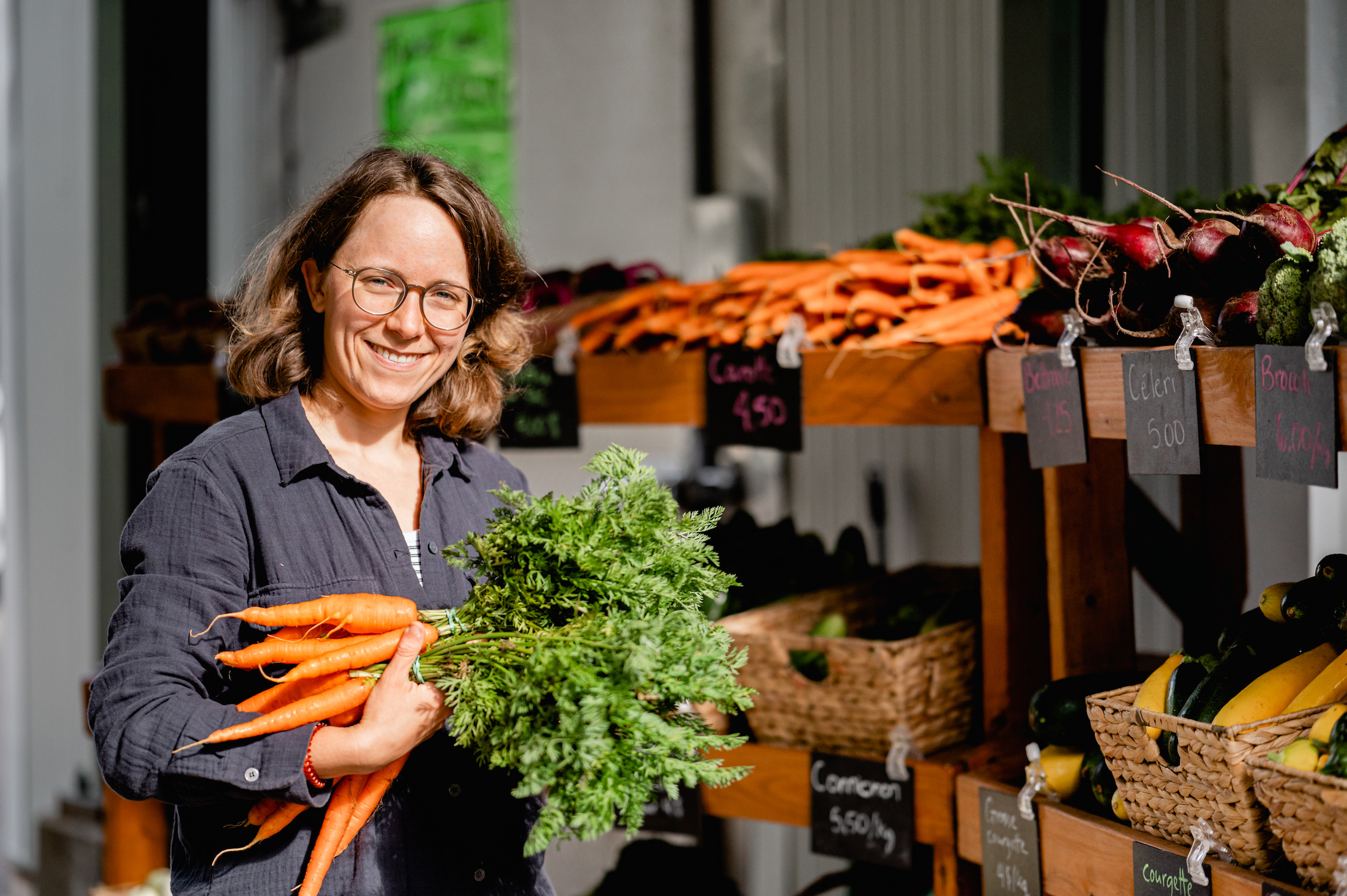
Three local farms combine their efforts to bring fresh, certified organic products directly from their fields and gardens to the Bio Locaux kiosk: the Ferme des Arpents roses, Terre fruitière, and the Ferme Trotteuse Coop. You can find their products at Maisonneuve Market every weekend, from Friday to Sunday, from June until the end of October. Gabrielle, the manager, is in charge of the outdoor kiosk, while the farmers keep busy tending the fields during those months of bounty. She’s the one who greets the consumers, most of them regulars who return weekly.
It’s Gabrielle’s job to promote the products of the three farms, including the Ferme des Arpents roses, located in Sainte-Mélanie, Lanaudière, which offers free-range pork as well as 40 types of organic vegetables, from carrots, turnips, aromatic herbs, onions, garlic, tomatoes and kale to Jerusalem artichokes.
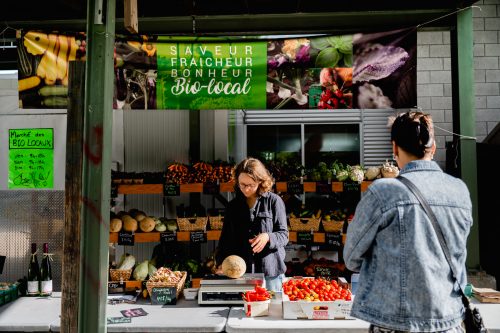
Also certified organic by Ecocert Canada, the young market garden farm Terre fruitière is known for its organic apple orchard. The owners are presently working to develop a small crop of plums, European pears and Asian pears on their land in Dunham in the Eastern Townships.
La Ferme Trotteuse Coop is an organic farm in Sainte-Marie-de-Blandford, Centre-du-Québec. For ecological and financial reasons, the Trotteuse producers use a method that has become very uncommon in Québec and of which they are very proud: workhorses! In addition to its vegetables, the farm offers free-range chicken and their eggs. Louis Ménard, a partner in the Trotteuse Coop, initiated the Bio Locaux project at Maisonneuve Market.
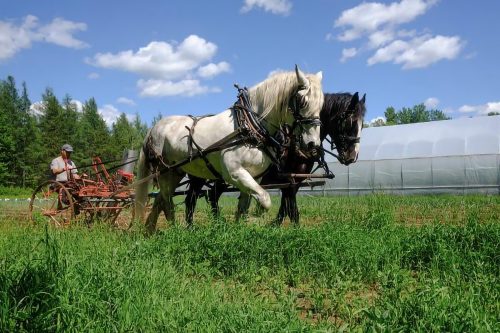
“I wanted to participate in a collective marketing project to expand my business and gain access to Montréal customers who aren’t in my direct distribution area,” says Louis Ménard. After selling at Maisonneuve Market for four years, he first had to find producers who were interested in developing this project with him and the CAPE, Coopérative pour l’agriculture de proximité écologique (Cooperative for local ecological agriculture).
“Working together, we can divide the tasks and we’ve even been able to hire an employee to manage the kiosk. Because of the distance, it wouldn’t have been possible for us to be present in Montréal otherwise,” says Mr. Ménard, whose main sales points are in Trois-Rivières and Victoriaville.
An Ideal Opportunity for the Next Generation
The Bio Locaux partners operate under a shared banner and have a web platform and sell their fruits and vegetables in organic baskets or simply from their display. This pooling allows the small farms to sell products they couldn’t otherwise, thus increasing their production. If one farm has a poor harvest, a partnering farm can make up the necessary volume that permits the group to continue offering a variety of interesting products to Maisonneuve Market customers throughout the season.
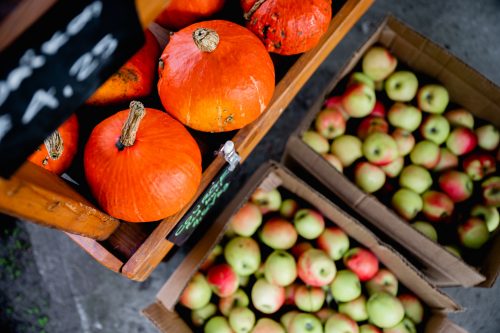
“It’s also a great way for producers who’re just starting out to team up with more seasoned farmers that have the experience to mentor them through the process,” explains Caroline Poirier, president of CAPÉ. Louis Ménard corroborates: “We talk to each other every week. It’s easy to get questions answered when we have a problem.”
Being at Maisonneuve Market also allows the producers, who come from three different regions quite far apart, to diversify their clientele. “In Trois-Rivières, the supply for prepaid organic baskets from the Fermiers de famille program is almost saturated. The demand isn’t as significant as it is in Montréal,” says Louis Ménard. “During the pandemic, all the restaurants we were servicing closed down, while in Montréal, everything related to buying local went crazy. It was a great year at the market last year! Diversifying our marketing channels makes us more resilient and allows us to weather storms like the one we had recently.” Just as the old saying goes: There’s strength in numbers!
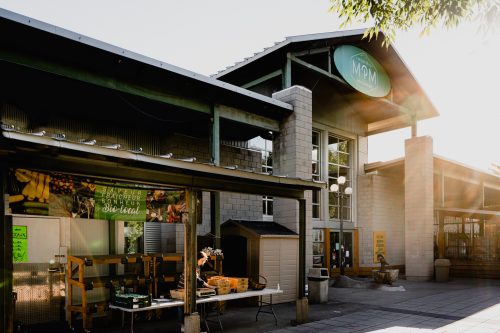
Quick Questions to Louis Ménard
Three words to describe the market’s vibe?Fresh, fruity, convivial.
Name must-have products from Maisonneuve Market?All the organic apples of Terre fruitière, the purslane of Les Arpents roses and the organic strawberries of La Trotteuse.
Your favourite foods as a child?My mother’s honey and ginger carrots, my grandmother’s Lac St-Jean blueberry pie, and of course her tourtière du lac!
About CAPE
The CAPE, Coopérative pour l’agriculture de proximité écologique (Cooperative for local ecological agriculture), was founded in 2013 by a handful of young farmers who wanted to share their farming experiences. In 2020, the cooperative took over from Équiterre and now oversees the Réseau des fermiers et fermières de famille (Family Farmers Network), which has 141 certified or pre-certified organic farms. Collective purchases, meetings and training, self-building and, of course, collective marketing via Bio Locaux, as in the Maisonneuve Market kiosk, are among the services offered by CAPE.
Text by Sophie Allard, magazine Caribou Translated by Marie-Andrée Parent Photos by Dominique Viau, BODOÜM photographie
Read all the FAMILY PORTRAITS
Producers, merchants and artisans together make up the Montréal Public Markets’ extended family. For years, often for generations, they’ve been getting up early, experimenting, sometimes starting over, nurturing, harvesting and flourishing! Day after day, they stand proudly behind their stalls as if by their own dining-room table, inviting us to feast. They’re the heart and soul of the markets – their very essence – and the reason we keep coming back. The Family Portrait series aims to pay tribute to all the pillars of our public markets.
This project is funded through the Programme Proximité of the ministère de l’Agriculture, des Pêcheries et de l’Alimentation, a program implemented under the Canadian Agricultural Partnership according to an agreement between the governments of Canada and Québec.Share...
Page Top